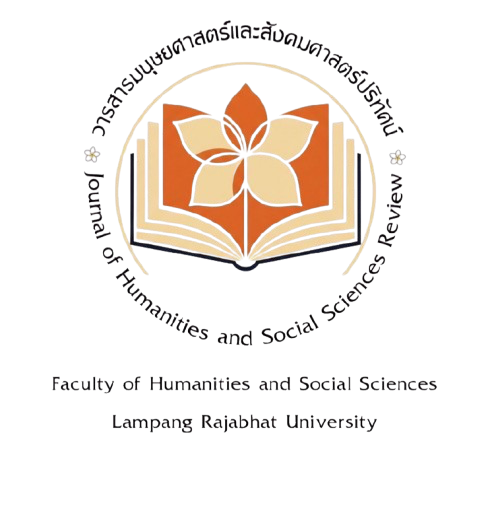Impact of the Enforcement of Suretyship Laws under the Amendments to the Civil and Commercial Code No. 20 and No. 21
Keywords:
civil and commercial code, suretyship, impact, enforcement of the lawAbstract
The Objectives of this research are to compare the principles of the law of suretyship before and after the legal amendment and to study the impact of enforcing such laws. It is a qualitative research study examining the principles of suretyship law as stipulated in the Civil and Commercial Code Book 3, Section 11, before the legal amendments. The amendments include the Additional Amendment to the Civil and Commercial Code Amendment Act (No. 20) B.E. 2557 and the Civil and Commercial Code Amendment Act (No. 21) B.E. 2558. Deep interviews were conducted with a sample group residing in the municipal area of Mueang District, Lampang Province, selected through purposive sampling among individuals affected by the legal amendments, totaling 15 people. The research tool used was interviews.
The study comparing the law of suretyship before and after the legal amendment found that the amendment has provided greater protection and fairness to surety. This is due to the clarification of details required to be specified in the guaranteed agreement. Several provisions have been introduced to prevent unfair treatment of surety, such as declaring certain agreements void, and requiring creditors to inform surety within 60 days from the date of default. However, upon studying the post-enforcement impact of the law, spanning from its effective date to the present, various practical challenges have emerged. These challenges have affected both surety and creditors, particularly financial institutions and businesses seeking credit from financial institutions for investment purposes. The problems or impacts stem from the ambiguity of the law, leading to differing legal interpretations in practice, including certain legal principles posing obstacles to business sectors. Therefore, the researchers propose amendments to enhance fairness for all parties and to ensure the effectiveness of the enforced suretyship law.
References
เจตน์ สถาวรศีลพร. (ม.ป.ป). การบังคับใช้กฎหมายให้เกิดความยุติธรรมในสังคม : ข้อพิจารณาบางประการว่าด้วยกฎหมาย การบังคับใช้กฎหมาย ความยุติธรรมกับสังคม. สืบค้นเมื่อ 1 มีนาคม 2559 จาก www.admincourt.go.th/00_web/09_academic/document/20100817.pdf.
คมกฤช เทียนทัด. (2562). ปัญหาในกฎหมายค้ำประกันภายหลังการแก้ไขเพิ่มเติมประมวลกฎหมายแพ่งและพาณิชย์ ฉบับที่ 20 และฉบับที่ 21. วารสารรัฏฐาภิรักษ์, 61(1), 61-66.
เชาว์วัศ สกุลวรวิทย์. (2549). ปัญหาและอุปสรรคในการบังคับใช้กฎหมายสิ่งแวดล้อม : ศึกษากรณีมลพิษทางน้ำ (วิทยานิพนธ์). สืบค้นจาก https://doi.nrct.go.th/ListDoi/listDetail?Resolve_DOI=10.14457/TU.the.2006.62
เดือนเด่น นิคมบริรักษ์. (2557). การวิเคราะห์ผลกระทบในการออกกฎหมาย. วารสารจุลนิติ, 11(4), 35-45.
นัยนา เกิดวิชัย. (2549). ความรู้เบื้องต้นเกี่ยวกับกฎหมาย. (พิมพ์ครั้งที่ 9). กรุงเทพฯ : นิตินัย.
มานิต จุมปา. (2555). ความรู้พื้นฐานเกี่ยวกับกฎหมาย. พิมพ์ครั้งที่ 11. กรุงเทพฯ : จุฬาลงกรณ์มหาวิทยาลัย.
ไพฑูรย์ คงสมบูรณ์. (2566). คำอธิบายกฎหมายลักษณะค้ำประกัน จำนอง จำนำ (พิมพ์ครั้งที่ 1). กรุงเทพฯ : นิติธรรม.
ศิพร โกวิท, จิรภัทร วรรณะธูป,ติณณภพ พัฒนะ, และโสรัตน์ กลับวิลา. (2567). การทบทวนความเหมาะสมของกฎหมาย. Journal of Roi Kaensarn Academi, 9(4), 377-378.
สายศิริ ศิริวิริยะกุล. (2558). ผลกระทบของกฎหมายใหม่ การค้ำประกันและจำนอง ตามพระราชบัญญัติแก้ไขเพิ่มเติมประมวลกฎหมายแพ่งและพาณิชย์. วารสารวิชาการ คณะนิติศาสตร์ มหาวิทยาลัยหอการค้าไทย, 7(1), 80-97.
สุดา วิศรุตพิชญ์. (2557). หลักกฎหมายค้ำประกัน จำนอง จำนำ ตาม พ.ร.บ.แก้ไขเพิ่มเติมประมวลกฎหมายแพ่งและพาณิชย์ (ฉบับที่ 20) พ.ศ.2557. พิมพ์ครั้งที่ 11. กรุงเทพฯ : วิญญูชน.

Downloads
Published
How to Cite
Issue
Section
License
Copyright (c) 2025 Journal of Humanities and Social Sciences Review, Lampang Rajabhat University

This work is licensed under a Creative Commons Attribution-NonCommercial-NoDerivatives 4.0 International License.
This article is published under a Creative Commons Attribution-NonCommercial-NoDerivatives 4.0 International License (CC BY-NC-ND 4.0), which allows others to share the article with proper attribution to the authors and prohibits commercial use or modification. For any other reuse or republication, permission from the journal and the authors is required.


